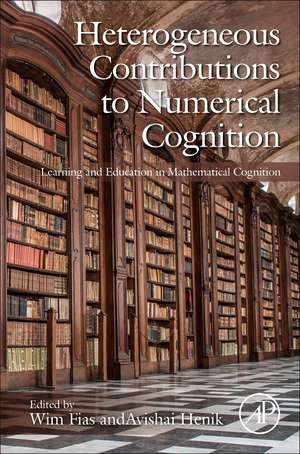Heterogeneous Contributions to Numerical Cognition: Learning and Education in Mathematical Cognition
Editat de Wim Fias, Avishai Heniken Limba Engleză Hardback – 27 mai 2021
- A novel innovative reference on the emerging field of numerical cognition and neurodevelopment underlying mathematical education
- Includes an overview of the multiple disciplines that comprise numerical cognition written by world-leading researchers in the numerical cognition and neurodevelopment fields
- Features an innovative organization with each section providing a general overview, developmental research, neurocognitive mechanisms, and discussion about relevant studies
Preț: 802.27 lei
Preț vechi: 1047.42 lei
-23% Nou
Puncte Express: 1203
Preț estimativ în valută:
153.51€ • 160.29$ • 126.77£
153.51€ • 160.29$ • 126.77£
Carte tipărită la comandă
Livrare economică 08-22 aprilie
Preluare comenzi: 021 569.72.76
Specificații
ISBN-13: 9780128174142
ISBN-10: 0128174145
Pagini: 422
Dimensiuni: 152 x 229 x 27 mm
Editura: ELSEVIER SCIENCE
ISBN-10: 0128174145
Pagini: 422
Dimensiuni: 152 x 229 x 27 mm
Editura: ELSEVIER SCIENCE
Public țintă
Neuroscientists, cognitive neuroscientists, neurophysiologists, educators, education researchers, neurologists, cognitive and developmental psychologists, graduate students, and post-doctoral fellowsCuprins
1. From quantical to numerical cognition: A crucial passage for understanding the nature of mathematics and its origins
SECTION I Advanced mathematics, reasoning and problem solving
2. Toward an inhibitory control theory of the reasoning brain in development
3. Maths and logic: Relationships across development
4. Cerebral underpinning of advanced mathematical activity
SECTION II Math education
5. Looking at the development of mathematical knowledge from the perspective of the framework theory approach to conceptual change: Lessons for mathematics education
6. Subtraction by addition: A remarkably natural and clever way to subtract?
7. Probing the neural basis rational numbers: The role of inhibitory control and magnitude representations
8. Learning and education in numerical cognition: We do need education
SECTION III Intervention studies
9. Supporting early numeracy: The role of spontaneous mathematical focusing tendencies in learning and instruction
10. Developmental course of numerical learning problems
in children and how to prevent dyscalculia: A summary of the longitudinal examination of children from kindergarten to secondary school
11. Neurocognitive mechanisms of numerical intervention studies: The case of brain stimulation
12. Intervention studies in math: A metareview
SECTION IV Math deficiencies and difficulties
13. The complex pathways toward the development of math anxiety and links with achievements
14. What predicts the development of fact retrieval speed and calculation accuracy in children with (and without) arithmetic disabilities (AD). What can we learn from longitudinal studies?
15. Early neurocognitive development of dyscalculia
16. Early difficulties in numerical cognition
SECTION I Advanced mathematics, reasoning and problem solving
2. Toward an inhibitory control theory of the reasoning brain in development
3. Maths and logic: Relationships across development
4. Cerebral underpinning of advanced mathematical activity
SECTION II Math education
5. Looking at the development of mathematical knowledge from the perspective of the framework theory approach to conceptual change: Lessons for mathematics education
6. Subtraction by addition: A remarkably natural and clever way to subtract?
7. Probing the neural basis rational numbers: The role of inhibitory control and magnitude representations
8. Learning and education in numerical cognition: We do need education
SECTION III Intervention studies
9. Supporting early numeracy: The role of spontaneous mathematical focusing tendencies in learning and instruction
10. Developmental course of numerical learning problems
in children and how to prevent dyscalculia: A summary of the longitudinal examination of children from kindergarten to secondary school
11. Neurocognitive mechanisms of numerical intervention studies: The case of brain stimulation
12. Intervention studies in math: A metareview
SECTION IV Math deficiencies and difficulties
13. The complex pathways toward the development of math anxiety and links with achievements
14. What predicts the development of fact retrieval speed and calculation accuracy in children with (and without) arithmetic disabilities (AD). What can we learn from longitudinal studies?
15. Early neurocognitive development of dyscalculia
16. Early difficulties in numerical cognition
